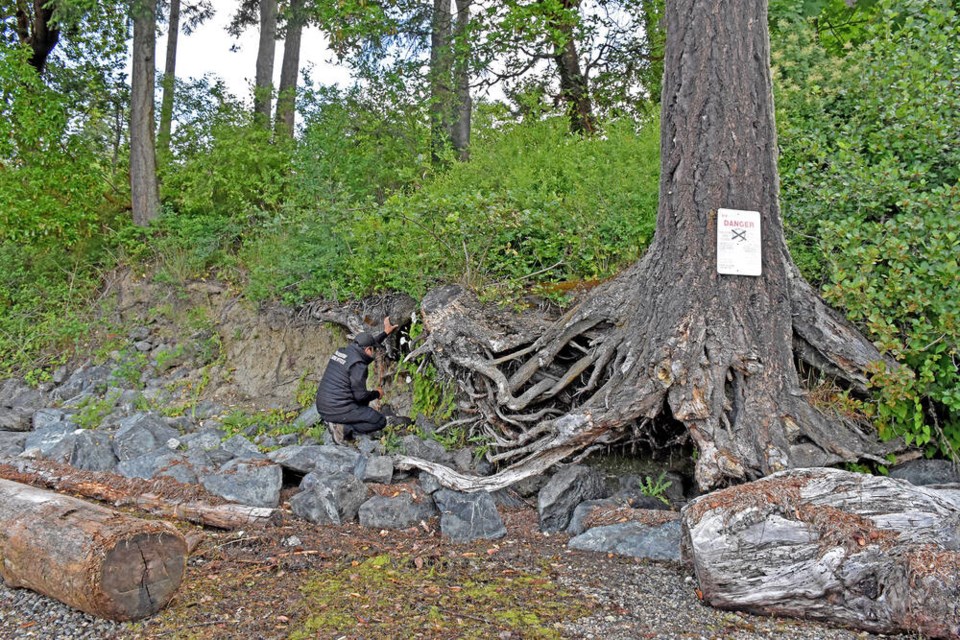A commentary by the chief of the Pauquachin First Nation.
“When the tide is out, the table is set.”
Coles Bay shellfish have played a central role in the lives of the Pauquachin people since time immemorial. But since 1997, DFO has ordered our people to not harvest shellfish from the bay, citing sanitary pollution concerns.
The on-going closure has struck the heart of our community. It has deprived families of a critically important food source, inflated food budgets and been a major blow to community nutrition and health.
Equally important, the closure impacts our traditional community gatherings, feasting and sharing; the bonds created when Elders share traditional shellfish knowledge with youth on our lands and waters; and cultural practices, ceremony, language, and art connected to shellfish harvests.
Tragically, the shellfish beds have remained closed — with scant government effort to fix the septic pollution and re-open this precious resource. Instead, for a quarter century, Pauquachin community members have been told to halt our traditional harvests — in violation of our treaty rights.
This tragic situation is common along the sa国际传媒 coast. Similar long-term sanitary closures exist along hundreds of kilometres of coastline.
Canadian governments have failed to put a priority on restoring our ongoing traditional harvests alongside us. The Province of British Columbia and local municipal governments have turned a blind eye to pollution — triggering long-term sanitary closures on our traditional and on-going harvest sites.
In addition, in recent decades Ottawa has slashed budgets for identifying and remediating polluted beaches. Instead, Ottawa has chosen to simply close beaches — with no mandate or real plan for restoration.
Such government indifference stands in stark contrast to our neighbouring Washington State. In response to court decisions recognizing treaty rights to fish, Washington law requires that within 180 days of a shellfish closure, a specific program must be implemented to find and correct the pollution source.
In contrast, here the federal Sanitary Shellfish Program closes beaches for decades – while provincial and local agencies fail to fix the septic and other pollution problems.
Washington State’s “Shellfish Initiative” has enabled Washington Tribes to collaborate with local, state and federal agencies to rehabilitate vast areas of shellfish beds. With government support, the U.S. tribes take the lead in identifying and fixing sources of pollution such as septic leaks, agricultural run-off, boat sewage, and toxic algae blooms.
Many thousands of acres of polluted shellfish beds have been cleaned up and re-opened in Washington – at the same time as sanitary pollution of shellfish continues to deteriorate along the sa国际传媒 coast.
We can learn from Washington State. Pauquachin First Nation stands ready to work alongside municipal, provincial and federal partners to initiate a pilot project to fully restore Coles Bay shellfish. Building on our Nation’s ongoing restoration efforts, the project would implement co-governance of shellfish management that focuses on restoration and remediation.
Today, on Indigenous Peoples Day, we urge sa国际传媒, British Columbia and local governments to stop ignoring our treaty rights to fish as formerly – and establish a Healthy Shellfish Initiative along the entire sa国际传媒 coast, with Coles Bay as the first trial site.
As a first step, today we are proud to release reports that detail the specific challenges and solutions at Coles Bay and along the sa国际传媒 coast — from both a provincial and North Saanich municipal perspective. A report on federal responsibilities will be released in the near future.
Coles Bay, immediately adjacent to Pauquachin First Nation, is ideal for prompt and practical ecological and eco-cultural remediation. It is a place where we, as a First Nation and peoples, can highlight a new way forward in reconciliation through food sovereignty.
The success of a Coles Bay pilot project will serve as a model for what can be accomplished along the entire coastline, where Canadian management currently leaves First Nations behind.
By implementing a successful Healthy Shellfish Initiative, Canadian governments can make a tangible contribution to the nutrition, health, cultural practice, and community well-being of the Pauquachin people and many other sa国际传媒 Nations.
It will be a step forward together in the right direction as we aim to implement the Declaration of the Rights of Indigenous Peoples. A province-wide Healthy Shellfish Initiative can become a partnership for justice and environmental restoration.
After all, politicians will speak fine words about reconciliation on this National Indigenous Peoples Day. But a Healthy Shellfish Initiative would be something far more – it would be reconciliation you can eat, reconciliation that will help restore a way of life.
Chief David thanks Calvin Sandborn, Environmental Law Centre students, and Pauquachin First Nation Marine Department for their efforts on the above proposal and reports. The reports are available at elc.uvic.ca and pauquachin.ca.
>>> To comment on this article, write a letter to the editor: [email protected]



